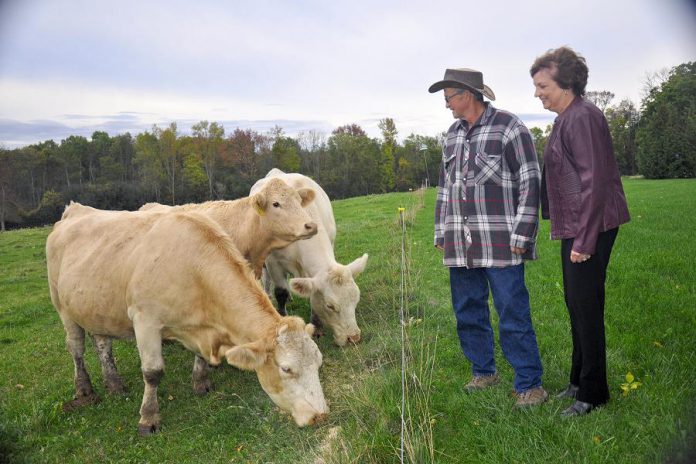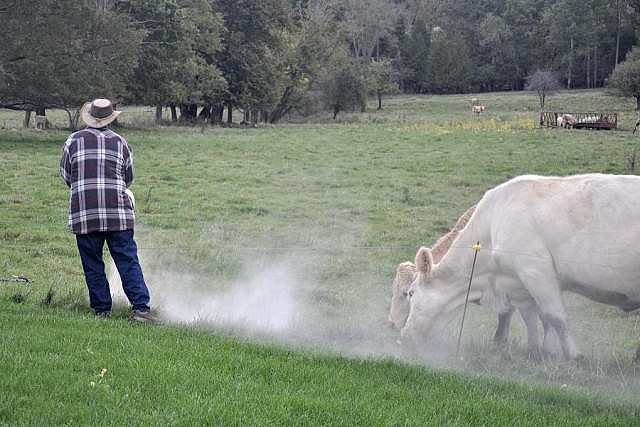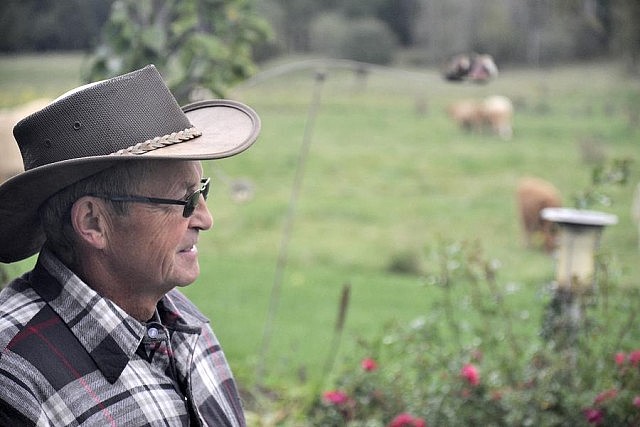
A few days after he was hiking in remote areas of Costa Rica and just days before his 66th birthday, David Whittington was doing what he did every day: working with his animals, managing his cattle farm in Stewart Hall, and looking forward to the spring calving season.
David is a third-generation beef farmer, so hard work, regular ups-and-downs, and the focus on family came naturally. There was absolutely nothing out of the ordinary. He’d even had a regularly scheduled electrocardiogram that morning at 8 a.m. Nothing unusual except that, unbeknownst to him, one of the arteries feeding his heart had a bend in it — something he’d never have known until, as they say, the music played.
That Tuesday night, David — his friends call him Dave — went curling in Keene, also a regular pastime. Like usual, his wife Cora stayed home. It was the night the music played.
He threw a rock and felt “off.” He went to throw another and realized he was going to “go down” if he didn’t sit down. Pauline, a retired nurse who happened to be at the rink, noticed and immediately rushed to his side, felt for his pulse, and looked at his colour. She knew, from years of experience, the dreaded truth: David was in the midst of a heart attack.
And she also knew it was likely a particular type of heart attack: a STEMI, or ST-segment elevation myocardial infarction, which is characterized by a sudden interruption of blood supply to a part of the heart.
Sadly, David’s story is not unique. There are an estimated 70,000 heart attacks each year in Canada. That’s one heart attack every seven minutes. And, according to Statistics Canada, many stories like this end tragically: almost 16,000 Canadians die each year as the result of a heart attack.
But David didn’t die, as there was a STEMI team in place at Peterborough Regional Health Centre (PRHC) to save his life.
That night, just down the road from the curling rink, volunteer firefighters were gathered for an evening meeting. They were at David’s side in minutes. The paramedics were also there in short order. Within 30 minutes, the man with the “broken” heart was being rushed through the doors at PRHC, a cardiologist at his side from ambulance door to the cardiac suite.
Within two hours, a life-saving procedure had preserved David’s life. He was in the Intensive Care Unit, with warm blankets, and his wife at his side.
“It was obviously not my day to leave this world,” David says now, sitting at the family table six months later and looking out over the cattle fields with a humble yet proud smile. He still tends his herd daily, and he was even in good enough shape to help with calving just four weeks after the heart attack. While he needs to get out to the field where his cattle are grazing, he wants to tell his story so that others will know how important the PRHC STEMI team is.

In 2012, PRHC opened its regional Percutaneous Coronary Intervention (angioplasty) program. PRHC now offers emergency “Code STEMI” cardiac stent procedures for patients throughout the region 24 hours a day, seven days a week, 365 days a year. And, through a partnership with paramedic services, the STEMI team is alerted to the patient before he or she even arrives at the hospital. There is no wait in the Emergency Department; the patient is escorted directly to the STEMI suite, the blockage is diagnosed, and — in cases like David’s where the possibility exists — the blockage is removed and the heart returns to its normal function.
“I watched the whole thing on the monitors,” David remembers. “I could see the blood hit the bend in the artery and stop. And then, when they unblocked it, I could see the blood go again. Woosh, just like that.”
Some would say the angels aligned, and David doesn’t rule out heavenly intervention, but he’s also a practical man.
“Everything just happened to go perfect for me,” he says. “This is all absolutely amazing to me, the way this happened.”
And while he’s amazed, he also knows why he survived.
“I have my life because the right people were there to help, and that includes Pauline, the firefighters, the paramedics, and — especially — the STEMI team at PRHC.”
While he was undergoing the procedure, David’s children rushed to the hospital to be with their father. After so little sleep and so much worry, by the time they arrived they were ready for the worst: the end of the story that we have come to expect. Instead, they went into their father’s room, and he greeted them with, “I hope you brought a deck of cards! I’m bored.”
That was less than 12 hours after his heart attack. Ten years ago, the heart attack would likely have killed David. Thanks to the STEMI team at PRHC, he was home three days later.
Since his heart attack, David’s attitude hasn’t changed a bit. He still loves and tends to his animals as he has since he was in his twenties. But when it comes to physical work, he is taking it a little easier.
Cora says he now tires after 12 hours of farm work rather than 15. And David has moved some of his operation to cash crops and downsized the beef operation, just to be on the safe side. But he’s still considering a new combine. The end of the road isn’t even close for David.

David wants to share his experience with the life-saving STEMI procedure at PRHC not just because it’s remarkable, but because he knows the program needs support.
“I have to do whatever I can to make sure this procedure is offered to as many people as possible,” he explains.
He also knows that the hospital relies on community donations to make significant investments in new and upgraded equipment and technology in the Cardiac Catheterization Lab.
“Technology keeps changing,” David says. “One piece of equipment could make such a big difference, and equipment wears out. No one knows that better than I do, as a farmer.”
For more information on PRHC’s Cardiac Catheterization Laboratory and the Code STEMI program that saved David’s life, read our story Community donations dramatically change cardiac care in the Kawarthas.
You can make great cardiac care possible at your hospital with a donation today. Please visit the PRHC Foundation website at www.prhcfoundation.ca for more details.
All photos by Jeanne Pengelly / kawarthaNOW


























